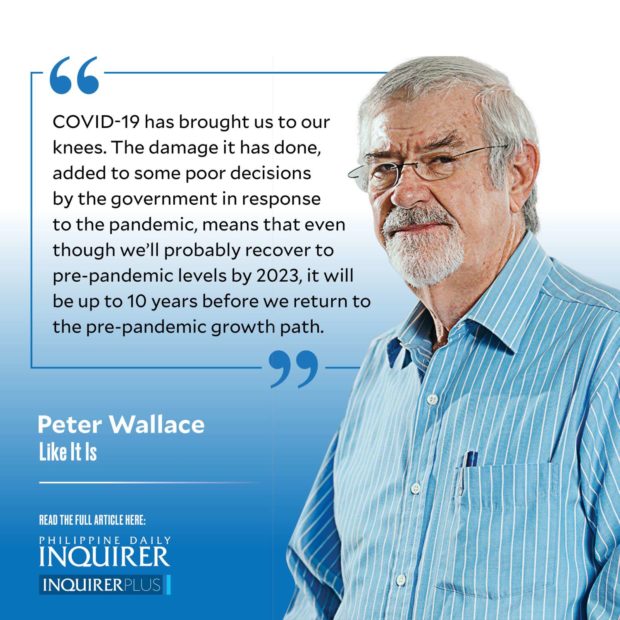Dire straits

COVID-19 has brought us to our knees. The damage it has done, added to some poor decisions by the government in response to the pandemic, means that even though we’ll probably recover to pre-pandemic levels by 2023, it will be up to 10 years before we return to the pre-pandemic growth path.
There was a recent excellent report by Socioeconomic Planning Secretary Karl Chua that raised this scenario. I’d like to incorporate it into what I’m saying here, because it tells it like it is. Or, more correctly, as it will be.
The worst to me is the poorly thought-out closure of all schools for over a year. A whole school year was lost that distance learning did not cover. A return to the classroom has still not happened, except for a minuscule “trial” group. So we are entering another year of inadequate education. It’s estimated in the US that online learning is only 52 percent as effective as face-to-face classes. If that data is adjusted to Philippine education levels, online learning by module is only 37 percent as effective. The World Bank estimates that in the Philippines the 12 years of schooling is equivalent to only eight years of learning. It’s sad, it’s frightening. And it can’t be made up later.
An acknowledged 1.1 million kids failed to enroll in 2020. The essential social interaction didn’t happen. As I’ve raised in earlier columns, we’re ranked at or very close to the bottom in international surveys of a country’s education of its kids. And that’s before COVID-19. The worst of it is that this further widens the gap between rich and poor, as the poor are more likely to have parents without the skills to help their children with their school work, so the parental guidance distance learning demands is not there. And with only 18 percent of them with internet access, few get anywhere near a decent level of schooling. With many eventually becoming dropouts and much of the poor inadequately fed, we are destined for a generation of underachievers.
Some 865 private schools had no option but to close down, and teachers lost their jobs. According to a Neda survey, to support those at-home kids struggling to learn, 60 percent of families had to keep one parent at home, resulting in a lost job and lost income.
Around the world, countries are learning that reopening schools with vaccinated teachers is sufficiently safe to do, with maybe some hotspots excluded. Why aren’t we doing it? The lack of education will lead to lower productivity, more illnesses, and earlier deaths from all that malnutrition and poor schooling. Overall, the Neda estimates that the cost of face-to-face school closure would amount to P11 trillion in lost wages over a 40-year period (the working life of a person).
The cost of COVID-19 to us last year was a lost P4.3 trillion. Over the next 10 to 40 years, it will be another P37 trillion due to lower consumption and demand along with slower investment as factories and businesses don’t get built, resulting in fewer jobs than there would have been without COVID-19. This will be particularly true in sectors that require social distancing like tourism, hospitality, restaurants, etc. That, in turn, will mean less revenue for the government as there will be less tax take.
In 2020, over 110,000 firms closed temporarily while 3,807 firms closed shop permanently. The resulting job loss reached 8.7 million at the height of the quarantine last year. Household wages declined by an average of P23,806 per worker last year.
As of today, 2.6 million Filipinos have had COVID-19, and many will suffer long-term effects such as fatigue and difficulty concentrating, which will affect one’s ability to work. Then there’s the emotional aspect. Workers who feel stressed or are worried, anxious, or depressed are likely to be less effective in their work.
What is also worrying is the massive 75-percent drop in PhilHealth claims for illnesses such as cancer, diabetes, and hypertension, which only means that individuals have been postponing health care. Those people, too, will be less productive. That will all add up to an estimated P4.5 trillion lost in wages and productivity over the next 40 years.
As I see it, all this means it’s time to seriously assess how we’re handling the pandemic. It is of paramount importance to hasten the roll-out of the vaccines. Except in identified high-risk areas, schools must be allowed to reopen. The experimental granular approach, and Joey Concepcion’s proposal for vaccine work bubbles, must be more seriously and rapidly implemented. We must get our kids back to school one way or another. And get the economy moving again. Fast.




















